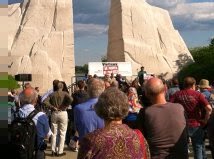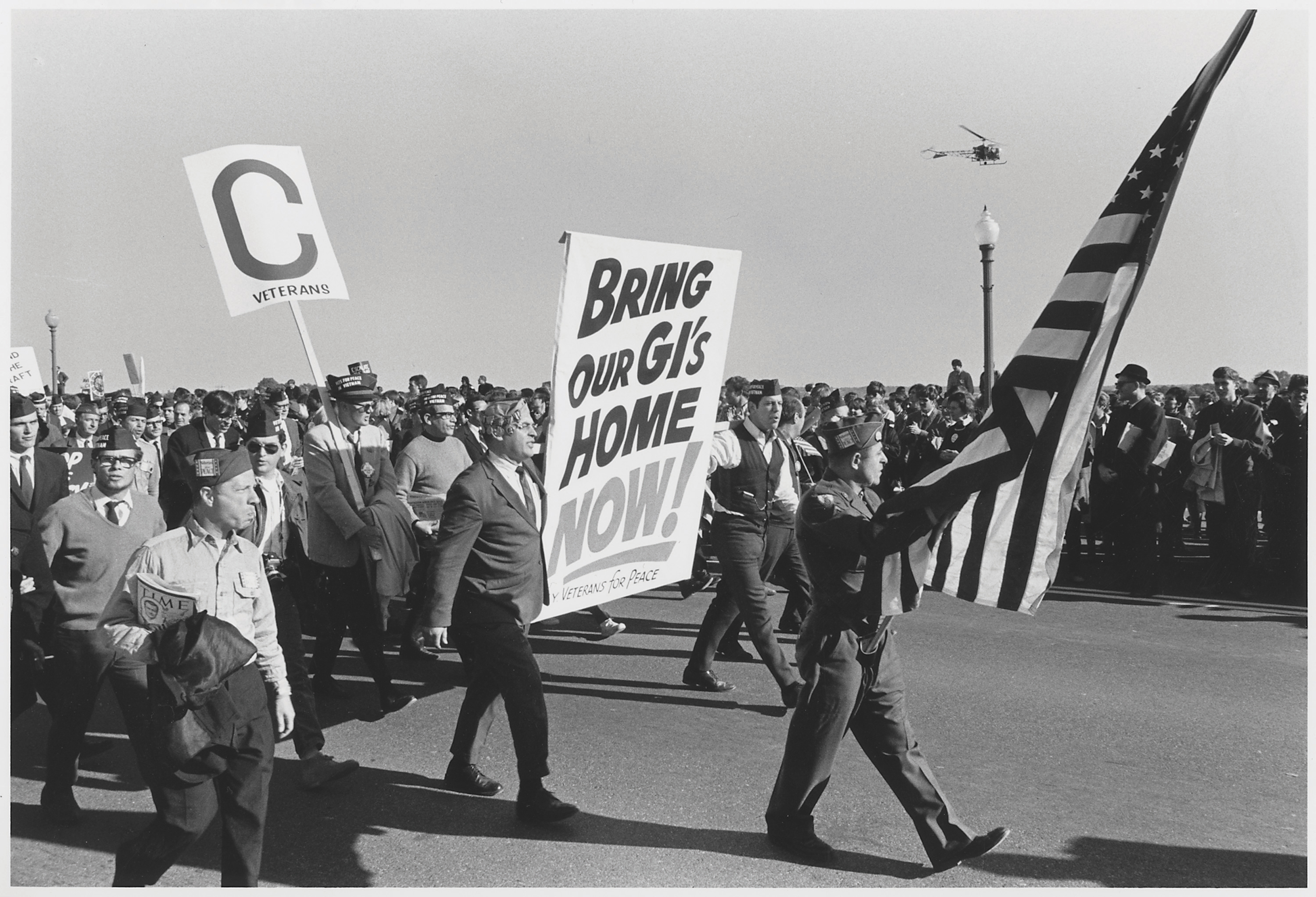 |
| Rep. Barbara Lee speaking to peace marchers (photo: Jan Barry) |
“It was the power of your protests that ended the Vietnam War!” Congresswoman Barbara Lee shouted out to a history-making group of graying peace activists who marched past the south lawn of the White House and trooped across the Mall to the Martin Luther King Jr. Memorial in Washington, DC on Saturday.
But her enthusiastic shout out was undercut by the indifference and bewilderment of swarms of tourists who stared at the spectacle of Washington police politely shepherding through the streets a motley crew of largely geriatric hippies, many of them unfashionably outfitted in faded denim, protest tee-shirts and 60’s peace signs.
As we marched along routes that were once lined by hostile riot-control cops whenever the peace movement came to town, I recalled so many previous attempts to convey a message of patriotic dissent—to president after president—against our government destroying a distant small nation and our own troops in a coldly blind fury, and viciously directed at home against anyone daring to seek discussion of peaceful alternatives.
 |
| Vets for Peace march in Washington, DC 1967 |
Few of those hundreds of thousands of peace marchers—many of them military veterans of World War II, Korea, Vietnam, plus civilians of every sort, preachers, teachers, students, parents, businessmen, housewives, families with young children, joined by members of Congress—who courageously challenged the government’s war policies in those previous times were there Saturday. This peace march was more like a civil war battle reenactment half a century later by a few hardy survivors.
In many ways, it was a last hurrah for age-challenged peace activists commemorating the 40th anniversary of the end of the US war in Vietnam in 1975 and the 50th anniversary of the first major peace march against Washington’s escalating war in Vietnam in the spring of 1965. In the front row of Saturday’s memory laden event was 84-year-old Daniel Ellsberg, the former Pentagon official who spirited a secret, internal, damning account of the military campaign to the news media, and several fellow octogenarians.
“The curtain is going down on our generation of activists,” former SDS sparkplug Tom Hayden, age 75, told a gathering of several hundred fellow 60’s peaceniks earlier in the day at a conference at the New York Avenue Presbyterian Church, titled “Vietnam: The Power of Protest.”
“Like the Vietnam veterans,” he continued, “we are dying every day.” It was an apt comment to a crowd that included a dwindling number of surviving members of Vietnam Veterans Against the War, Veterans for Peace in Vietnam and other groups of dissenting soldiers from back in the day of a raging war that sucked young men right out of high school and college classes and into combat in Vietnam.
Addressing the reunion of Social Security pensioners who were once young, hearty peace campaigners challenging the military might of the United States government, Hayden aired another sobering observation:
“There’s an effort to punish us in retrospect by eliminating us from history,” he said. A major sign of this attempt to rewrite history is President Obama’s 2012 proclamation that the US role in the Vietnam War is to be celebrated by the nation for 13 years. The official website for this war celebration, created at the Pentagon, left out the peace movement.
Another sign is that no one representing the Nobel Peace Prize-winning president attended the Vietnam peace movement commemoration to congratulate these compatriots of Dr. Martin Luther King Jr. and his Nobel Peace Prize-winning stance in the 1960s. Not even Secretary of State John Kerry, once a leader of Vietnam Vets Against the War, appeared to deliver greetings from the administration, so busily conducting secret negotiations tangled in endless wars in the Middle East, Afghanistan, Pakistan and elsewhere.
And so the little band of peace activist elders was greeted by Julian Bond, long retired from government, who was elected to Congress as a civil rights leader and Vietnam peace activist long before Obama sought public office and sought to fashion an historical mantle as a peace-seeking candidate for president.
“It is fitting that we should have come to this place,” Bond told the peace march participants gathered at the Martin Luther King Jr. Memorial. “Dr. King believed that civil rights and peace were inexorably linked.”
The burial of this vital part of American history was abetted by the mainstream news media, which provided no coverage of the Vietnam peace campaign commemorative gathering. Imagine if Obama and the news media had ignored the 50th anniversary commemoration of the 1963 civil rights march on Washington at which King gave a rousing speech, now lost to history.
And so actor Danny Glover read a passage from King’s peace in Vietnam speech, a portion about how the war was destroying the fabric of American life for so many people. Danny Glover’s voice was nearly drowned out by a Marine helicopter buzzing overhead, as it circled yet again to do a series of practice takeoffs and landings on the White House lawn.











